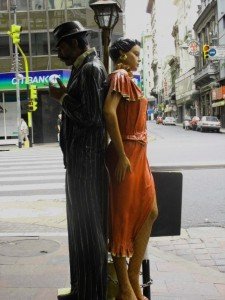 Rioplatense or River Plate Spanish, the dialect of Spanish spoken in and around Buenos Aires, Argentina, is characterized by a number of features, most notably the use of voseo and Lunfardo slang; however, a lesser-known phenomenon called “hablar en capicúa” or “hablar en sánguche” also exists within the dialect.
Rioplatense or River Plate Spanish, the dialect of Spanish spoken in and around Buenos Aires, Argentina, is characterized by a number of features, most notably the use of voseo and Lunfardo slang; however, a lesser-known phenomenon called “hablar en capicúa” or “hablar en sánguche” also exists within the dialect.
Hablar en capicúa (known in English as epanalepsis) consists of taking a word or pair of words appearing at the beginning of a sentence and repeating it at the end. In Rioplatense Spanish, there is typically a slight pause and a downward inflection when the repeated words are spoken.
The word “capicúa” means palindrome (a word, sentence, etc. that reads the same forwards and backwards). Thus, hablar in capicúa is to speak in palindromes, as the repetition of the same word at the beginning and end of the sentence produces a palindrome of sorts. Others refer to this rhetorical term as “sandwich speak” (hablar en sánguche) presumably because part of the phrase is sandwiched between the two repeated bits.
Examples:
Me tomé todo el vino, me tomé. // I drank all the wine, I drank [it].
Sos un buen tipo, sos. // You’re a good guy, you are.
Tengo que morfar, tengo. // I have to eat, I have to.
Unlike Lunfardo and voseo, which have been adopted by Rioplatense speakers at all socioeconomic levels, hablar en capicúa is primarily employed by less-educated speakers.







